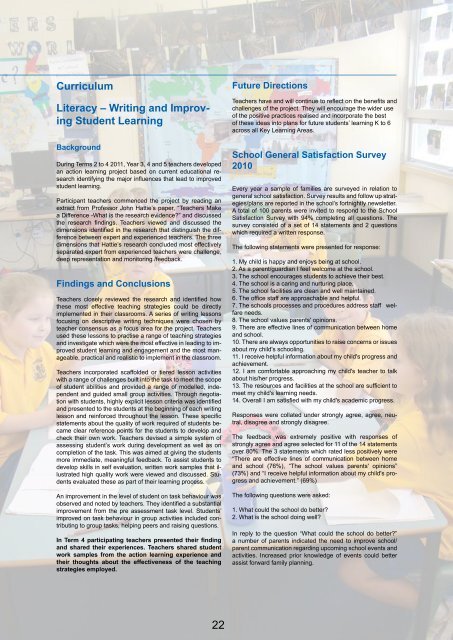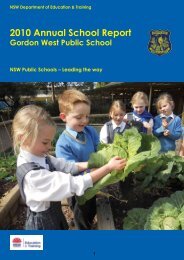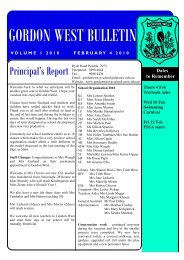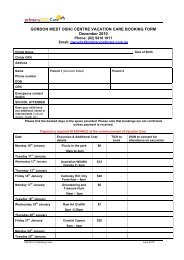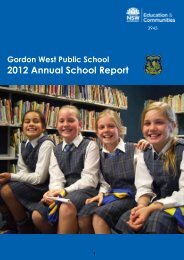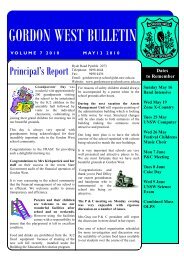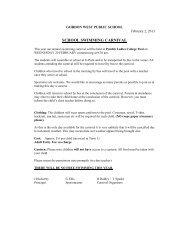2011 Annual School Report - Gordon West Public School
2011 Annual School Report - Gordon West Public School
2011 Annual School Report - Gordon West Public School
You also want an ePaper? Increase the reach of your titles
YUMPU automatically turns print PDFs into web optimized ePapers that Google loves.
Curriculum<br />
Literacy – Writing and Improving<br />
Student Learning<br />
Background<br />
During Terms 2 to 4 <strong>2011</strong>, Year 3, 4 and 5 teachers developed<br />
an action learning project based on current educational research<br />
identifying the major influences that lead to improved<br />
student learning.<br />
Participant teachers commenced the project by reading an<br />
extract from Professor John Hattie’s paper, “Teachers Make<br />
a Difference -What is the research evidence?” and discussed<br />
the research findings. Teachers viewed and discussed the<br />
dimensions identified in the research that distinguish the difference<br />
between expert and experienced teachers. The three<br />
dimensions that Hattie’s research concluded most effectively<br />
separated expert from experienced teachers were challenge,<br />
deep representation and monitoring /feedback.<br />
Findings and Conclusions<br />
Teachers closely reviewed the research and identified how<br />
these most effective teaching strategies could be directly<br />
implemented in their classrooms. A series of writing lessons<br />
focusing on descriptive writing techniques were chosen by<br />
teacher consensus as a focus area for the project. Teachers<br />
used these lessons to practise a range of teaching strategies<br />
and investigate which were the most effective in leading to improved<br />
student learning and engagement and the most manageable,<br />
practical and realistic to implement in the classroom.<br />
Teachers incorporated scaffolded or tiered lesson activities<br />
with a range of challenges built into the task to meet the scope<br />
of student abilities and provided a range of modelled, independent<br />
and guided small group activities. Through negotiation<br />
with students, highly explicit lesson criteria was identified<br />
and presented to the students at the beginning of each writing<br />
lesson and reinforced throughout the lesson. These specific<br />
statements about the quality of work required of students became<br />
clear reference points for the students to develop and<br />
check their own work. Teachers devised a simple system of<br />
assessing student’s work during development as well as on<br />
completion of the task. This was aimed at giving the students<br />
more immediate, meaningful feedback. To assist students to<br />
develop skills in self evaluation, written work samples that illustrated<br />
high quality work were viewed and discussed. Students<br />
evaluated these as part of their learning process.<br />
An improvement in the level of student on task behaviour was<br />
observed and noted by teachers. They identified a substantial<br />
improvement from the pre assessment task level. Students’<br />
improved on task behaviour in group activities included contributing<br />
to group tasks, helping peers and raising questions.<br />
In Term 4 participating teachers presented their finding<br />
and shared their experiences. Teachers shared student<br />
work samples from the action learning experience and<br />
their thoughts about the effectiveness of the teaching<br />
strategies employed.<br />
Future Directions<br />
Teachers have and will continue to reflect on the benefits and<br />
challenges of the project. They will encourage the wider use<br />
of the positive practices realised and incorporate the best<br />
of these ideas into plans for future students’ learning K to 6<br />
across all Key Learning Areas.<br />
<strong>School</strong> General Satisfaction Survey<br />
2010<br />
Every year a sample of families are surveyed in relation to<br />
general school satisfaction. Survey results and follow up strategies/plans<br />
are reported in the school’s fortnightly newsletter.<br />
A total of 100 parents were invited to respond to the <strong>School</strong><br />
Satisfaction Survey with 94% completing all questions. The<br />
survey consisted of a set of 14 statements and 2 questions<br />
which required a written response.<br />
The following statements were presented for response:<br />
1. My child is happy and enjoys being at school.<br />
2. As a parent/guardian I feel welcome at the school.<br />
3. The school encourages students to achieve their best.<br />
4. The school is a caring and nurturing place.<br />
5. The school facilities are clean and well maintained.<br />
6. The office staff are approachable and helpful.<br />
7. The schools processes and procedures address staff welfare<br />
needs.<br />
8. The school values parents' opinions.<br />
9. There are effective lines of communication between home<br />
and school.<br />
10. There are always opportunities to raise concerns or issues<br />
about my child's schooling.<br />
11. I receive helpful information about my child's progress and<br />
achievement.<br />
12. I am comfortable approaching my child's teacher to talk<br />
about his/her progress.<br />
13. The resources and facilities at the school are sufficient to<br />
meet my child's learning needs.<br />
14. Overall I am satisfied with my child's academic progress.<br />
Responses were collated under strongly agree, agree, neutral,<br />
disagree and strongly disagree.<br />
The feedback was extremely positive with responses of<br />
strongly agree and agree selected for 11 of the 14 statements<br />
over 80%. The 3 statements which rated less positively were<br />
“There are effective lines of communication between home<br />
and school (76%), “The school values parents' opinions”<br />
(73%) and “I receive helpful information about my child's progress<br />
and achievement.” (69%)<br />
The following questions were asked:<br />
1. What could the school do better?<br />
2. What is the school doing well?<br />
In reply to the question “What could the school do better?”<br />
a number of parents indicated the need to improve school/<br />
parent communication regarding upcoming school events and<br />
activities. Increased prior knowledge of events could better<br />
assist forward family planning.<br />
22


